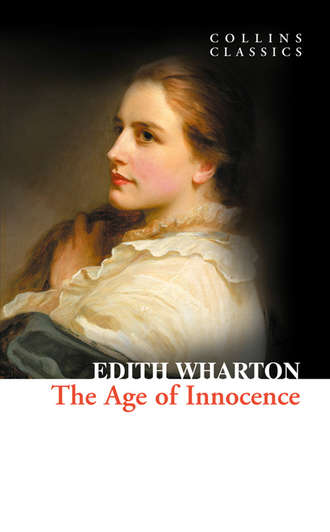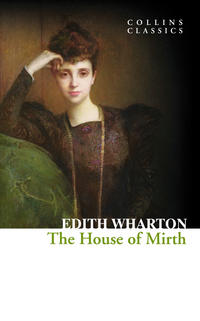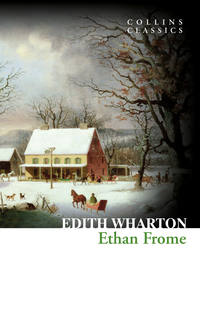
Полная версия
The Age of Innocence
The young man was sincerely but placidly in love. He delighted in the radiant good looks of his betrothed, in her health, her horse-manship, her grace and quickness at games, and the shy interest in books and ideas that she was beginning to develop under his guidance. (She had advanced far enough to join him in ridiculing the Idyls of the King, but not to feel the beauty of Ulysses and the Lotus Eaters.) She was straightforward, loyal and brave; she had a sense of humour (chiefly proved by her laughing at his jokes); and he suspected, in the depths of her innocently-gazing, soul, a glow of feeling that it would be a joy to waken. But when he had gone the brief round of her he returned discouraged by the thought that all this frankness and innocence were only an artificial product. Untrained human nature was not frank and innocent; it was full of the twists and defences of an instinctive guile. And he felt himself oppressed by this creation of factitious purity, so cunningly manufactured by a conspiracy of mothers and aunts and grandmothers and long-dead ancestresses, because it was supposed to be what he wanted, what he had a right to, in order that he might exercise his lordly pleasure in smashing it like an image made of snow.
There was a certain triteness in these reflections: they were those habitual to young men on the approach of their wedding day. But they were generally accompanied by a sense of compunction and self-abasement of which Newland Archer felt no trace. He could not deplore (as Thackeray’s heroes so often exasperated him by doing) that he had not a blank page to offer his bride in exchange for the unblemished one she was to give to him. He could not get away from the fact that if he had been brought up as she had they would have been no more fit to find their way about than the Babes in the Wood; nor could he, for all his anxious cogitations, see any honest reason (any, that is, unconnected with his own momentary pleasure, and the passion of masculine vanity) why his bride should not have been allowed the same freedom of experience as himself.
Such questions, at such an hour, were bound to drift through his mind; but he was conscious that their uncomfortable persistence and precision were due to the inopportune arrival of the Countess Olenska. Here he was, at the very moment of his betrothal— a moment for pure thoughts and cloudless hopes—pitchforked into the coil of scandal which raised all the special problems he would have preferred to let lie. “Hang Ellen Olenska!” he grumbled, as he covered his fire and began to undress. He could not really see why her fate should have the least bearing on his; yet he dimly felt that he had only just begun to measure the risks of the champion -ship which his engagement had forced upon him.
A few days later the bolt fell.
The Lovell Mingotts had sent out cards for what was known as “a formal dinner” (that is, three extra footmen, two dishes for each course, and a Roman punch in the middle), and had headed their invitations with the words “To meet the Countess Olenska,” in accordance with the hospitable American fashion, which treats strangers as if they were royalties, or at least as their ambassadors.
The guests had been selected with a boldness and dis -crimination in which the initiated recognised the firm hand of Catherine the Great. Associated with such immemorial standbys as the Selfridge Merrys, who were asked everywhere because they always had been, the Beauforts, on whom there was a claim of relation ship, and Mr. Sillerton Jackson and his sister Sophy (who went wherever her brother told her to), were some of the most fashionable and yet most irreproachable of the dominant “young married” set; the Lawrence Leffertses, Mrs. Lefferts Rushworth (the lovely widow), the Harry Thorleys, the Reggie Chiverses and young Morris Dagonet and his wife (who was a van der Luyden). The company indeed was perfectly assorted, since all the members belonged to the little inner group of people who, during the long New York season, disported themselves together daily and nightly with apparently undiminished zest.
Forty-eight hours later the unbelievable had happened; every one had refused the Mingotts’ invitation except the Beauforts and old Mr. Jackson and his sister. The intended slight was emphasised by the fact that even the Reggie Chiverses, who were of the Mingott clan, were among those inflicting it; and by the uniform wording of the notes, in all of which the writers “regretted that they were unable to accept,” without the mitigating plea of a “previous engagement” that ordinary courtesy prescribed.
New York society was, in those days, far too small, and too scant in its resources, for everyone in it (including livery-stable-keepers, butlers and cooks) not to know exactly on which evenings people were free; and it was thus possible for the recipients of Mrs. Lovell Mingott’s invitations to make cruelly clear their determination not to meet the Countess Olenska.
The blow was unexpected; but the Mingotts, as their way was, met it gallantly. Mrs. Lovell Mingott confided the case to Mrs. Welland, who confided it to Newland Archer; who, aflame at the outrage, appealed passionately and authoritatively to his mother; who, after a painful period of inward resistance and outward temporising, succumbed to his instances (as she always did), and immediately embracing his cause with an energy redoubled by her previous hesitations, put on her grey velvet bonnet and said: “I’ll go and see Louisa van der Luyden.”
The New York of Newland Archer’s day was a small and slippery pyramid, in which, as yet, hardly a fissure had been made or a foothold gained. At its base was a firm foundation of what Mrs. Archer called “plain people”; an honourable but obscure majority of respectable families who (as in the case of the Spicers or the Leffertses or the Jacksons) had been raised above their level by marriage with one of the ruling clans. People, Mrs. Archer always said, were not as particular as they used to be; and with old Catherine Spicer ruling one end of Fifth Avenue, and Julius Beaufort the other, you couldn’t expect the old traditions to last much longer.
Firmly narrowing upward from this wealthy but inconspicuous substratum was the compact and dominant group which the Mingotts, Newlands, Chiverses and Mansons so actively represented. Most people imagined them to be the very apex of the pyramid; but they themselves (at least those of Mrs. Archer’s generation) were aware that, in the eyes of the professional genealogist, only a still smaller number of families could lay claim to that eminence.
“Don’t tell me,” Mrs. Archer would say to her children, “all this modern newspaper rubbish about a New York aristocracy. If there is one, neither the Mingotts nor the Mansons belong to it; no, nor the Newlands or the Chiverses either. Our grandfathers and great-grandfathers were just respectable English or Dutch merchants, who came to the colonies to make their fortune, and stayed here because they did so well. One of your great-grandfathers signed the Declaration, and another was a general on Washington’s staff, and received General Burgoyne’s sword after the battle of Saratoga. These are things to be proud of, but they have nothing to do with rank or class. New York has always been a commercial community, and there are not more than three families in it who can claim an aristocratic origin in the real sense of the word.”
Mrs. Archer and her son and daughter, like every one else in New York, knew who these privileged beings were: the Dagonets of Washington Square, who came of an old English county family allied with the Pitts and Foxes; the Lannings, who had intermarried with the descendants of Count de Grasse; and the van der Luydens, direct descendants of the first Dutch governor of Manhattan, and related by pre-revolutionary marriages to several members of the French and British aristocracy.
The Lannings survived only in the person of two very old but lively Miss Lannings, who lived cheerfully and reminiscently among family portraits and Chippendale; the Dagonets were a considerable clan, allied to the best names in Baltimore and Philadelphia; but the van der Luydens, who stood above all of them, had faded into a kind of super-terrestrial twilight, from which only two figures impressively emerged; those of Mr. and Mrs. Henry van der Luyden.
Mrs. Henry van der Luyden had been Louisa Dagonet, and her mother had been the granddaughter of Colonel du Lac, of an old Channel Island family, who had fought under Cornwallis and had settled in Maryland, after the war, with his bride, Lady Angelica Trevenna, fifth daughter of the Earl of St. Austrey. The tie between the Dagonets, the du Lacs of Maryland, and their aristocratic Cornish kinsfolk, the Trevennas, had always remained close and cordial. Mr. and Mrs. van der Luyden had more than once paid long visits to the present head of the house of Trevenna, the Duke of St. Austrey, at his country-seat in Cornwall and at St. Austrey in Gloucestershire; and his Grace had frequently announced his intention of some day returning their visit (without the Duchess, who feared the Atlantic).
Mr. and Mrs. van der Luyden divided their time between Trevenna, their place in Maryland, and Skuytercliff, the great estate on the Hudson which had been one of the colonial grants of the Dutch government to the famous first Governor, and of which Mr. van der Luyden was still “Patroon.” Their large solemn house in Madison Avenue was seldom opened, and when they came to town they received in it only their most intimate friends.
“I wish you would go with me, Newland,” his mother said, suddenly pausing at the door of the Brown coupé. “Louisa is fond of you; and of course it’s on account of dear May that I’m taking this step—and also because, if we don’t all stand together, there’ll be no such thing as Society left.”
Chapter 7
Mrs. Henry van der Luyden listened in silence to her cousin Mrs. Archer’s narrative.
It was all very well to tell yourself in advance that Mrs. van der Luyden was always silent, and that, though non-committal by nature and training, she was very kind to the people she really liked. Even personal experience of these facts was not always a protection from the chill that descended on one in the high-ceilinged white-walled Madison Avenue drawing-room, with the pale brocaded armchairs so obviously uncovered for the occasion, and the gauze still veiling the ormolu mantel ornaments and the beautiful old carved frame of Gainsborough’s “Lady Angelica du Lac.”
Mrs. van der Luyden’s portrait by Huntington (in black velvet and Venetian point) faced that of her lovely ancestress. It was generally considered “as fine as a Cabanel,” and, though twenty years had elapsed since its execution, was still “a perfect likeness.” Indeed the Mrs. van der Luyden who sat beneath it listening to Mrs. Archer might have been the twin-sister of the fair and still youngish woman drooping against a gilt armchair before a green rep curtain. Mrs. van der Luyden still wore black velvet and Venetian point when she went into society—or rather (since she never dined out) when she threw open her own doors to receive it. Her fair hair, which had faded without turning grey, was still parted in flat overlapping points on her forehead, and the straight nose that divided her pale blue eyes was only a little more pinched about the nostrils than when the portrait had been painted. She always, indeed, struck Newland Archer as having been rather gruesomely preserved in the airless atmosphere of a perfectly irreproachable existence, as bodies caught in glaciers keep for years a rosy life-in-death.
Like all his family, he esteemed and admired Mrs. van der Luyden; but he found her gentle bending sweetness less approachable than the grimness of some of his mother’s old aunts, fierce spinsters who said “No” on principle before they knew what they were going to be asked.
Mrs. van der Luyden’s attitude said neither yes nor no, but always appeared to incline to clemency till her thin lips, wavering into the shadow of a smile, made the almost invariable reply: “I shall first have to talk this over with my husband.”
She and Mr. van der Luyden were so exactly alike that Archer often wondered how, after forty years of the closest conjugality, two such merged identities ever separated themselves enough for anything as controversial as a talking-over. But as neither had ever reached a decision without prefacing it by this mysterious conclave, Mrs. Archer and her son, having set forth their case, waited resignedly for the familiar phrase.
Mrs. van der Luyden, however, who had seldom surprised any one, now surprised them by reaching her long hand toward the bell-rope.
“I think,” she said, “I should like Henry to hear what you have told me.”
A footman appeared, to whom she gravely added: “If Mr. van der Luyden has finished reading the newspaper, please ask him to be kind enough to come.”
She said “reading the newspaper” in the tone in which a Minister’s wife might have said: “Presiding at a Cabinet meeting”— not from any arrogance of mind, but because the habit of a lifetime, and the attitude of her friends and relations, had led her to consider Mr. van der Luyden’s least gesture as having an almost sacerdotal importance.
Her promptness of action showed that she considered the case as pressing as Mrs. Archer; but, lest she should be thought to have committed herself in advance, she added, with the sweetest look: “Henry always enjoys seeing you, dear Adeline; and he will wish to congratulate Newland.”
The double doors had solemnly reopened and between them appeared Mr. Henry van der Luyden, tall, spare and frock-coated, with faded fair hair, a straight nose like his wife’s and the same look of frozen gentleness in eyes that were merely pale grey instead of pale blue.
Mr. van der Luyden greeted Mrs. Archer with cousinly affability, proffered to Newland low-voiced congratulations couched in the same language as his wife’s, and seated himself in one of the brocade armchairs with the simplicity of a reigning sovereign.
“I had just finished reading the Times,” he said, laying his long finger-tips together. “In town my mornings are so much occupied that I find it more convenient to read the newspapers after luncheon.”
“Ah, there’s a great deal to be said for that plan—indeed I think my uncle Egmont used to say he found it less agitating not to read the morning papers till after dinner,” said Mrs. Archer responsively.
“Yes: my good father abhorred hurry. But now we live in a constant rush,” said Mr. van der Luyden in measured tones, looking with pleasant deliberation about the large shrouded room which to Archer was so complete an image of its owners.
“But I hope you had finished your reading, Henry?” his wife interposed.
“Quite—quite,” he reassured her.
“Then I should like Adeline to tell you—”
“Oh, it’s really Newland’s story,” said his mother smiling; and proceeded to rehearse once more the monstrous tale of the affront inflicted on Mrs. Lovell Mingott.
“Of course,” she ended, “Augusta Welland and Mary Mingott both felt that, especially in view of Newland’s engagement, you and Henry ought to know.”
“Ah—” said Mr. van der Luyden, drawing a deep breath.
There was a silence during which the tick of the monumental ormolu clock on the white marble mantelpiece grew as loud as the boom of a minute-gun. Archer contemplated with awe the two slender faded figures, seated side by side in a kind of viceregal rigidity, mouth-pieces of some remote ancestral authority which fate compelled them to wield, when they would so much rather have lived in simplicity and seclusion, digging invisible weeds out of the perfect lawns of Skuytercliff, and playing Patience together in the evenings.
Mr. van der Luyden was the first to speak.
“You really think this is due to some—some intentional interference of Lawrence Lefferts’s?” he enquired, turning to Archer.
“I’m certain of it, sir. Larry has been going it rather harder than usual lately—if cousin Louisa won’t mind my mentioning it— having rather a stiff affair with the postmaster’s wife in their village, or someone of that sort; and whenever poor Gertrude Lefferts begins to suspect anything, and he’s afraid of trouble, he gets up a fuss of this kind, to show how awfully moral he is, and talks at the top of his voice about the impertinence of inviting his wife to meet people he doesn’t wish her to know. He’s simply using Madame Olenska as a lightning-rod; I’ve seen him try the same thing often before.”
“The Leffertses!—” said Mrs. van der Luyden.
“The Leffertses!—” echoed Mrs. Archer. “What would uncle Egmont have said of Lawrence Lefferts’s pronouncing on anybody’s social position? It shows what Society has come to.”
“We’ll hope it has not quite come to that,” said Mr. van der Luyden firmly.
“Ah, if only you and Louisa went out more!” sighed Mrs. Archer.
But instantly she became aware of her mistake. The van der Luydens were morbidly sensitive to any criticism of their secluded existence. They were the arbiters of fashion, the Court of last Appeal, and they knew it, and bowed to their fate. But being shy and retiring persons, with no natural inclination for their part, they lived as much as possible in the sylvan solitude of Skuytercliff, and when they came to town, declined all invitations on the plea of Mrs. van der Luyden’s health.
Newland Archer came to his mother’s rescue. “Everybody in New York knows what you and cousin Louisa represent. That’s why Mrs. Mingott felt she ought not to allow this slight on Countess Olenska to pass without consulting you.”
Mrs. van der Luyden glanced at her husband, who glanced back at her.
“It is the principle that I dislike,” said Mr. van der Luyden. “As long as a member of a well-known family is backed up by that family it should be considered—final.”
“It seems so to me,” said his wife, as if she were producing a new thought.
“I had no idea,” Mr. van der Luyden continued, “that things had come to such a pass.” He paused, and looked at his wife again. “It occurs to me, my dear, that the Countess Olenska is already a sort of relation—through Medora Manson’s first husband. At any rate, she will be when Newland marries.” He turned toward the young man. “Have you read this morning’s Times, Newland?”
“Why, yes, sir,” said Archer, who usually tossed off half a dozen papers with his morning coffee.
Husband and wife looked at each other again. Their pale eyes clung together in prolonged and serious consultation; then a faint smile fluttered over Mrs. van der Luyden’s face. She had evidently guessed and approved.
Mr. van der Luyden turned to Mrs. Archer. “If Louisa’s health allowed her to dine out—I wish you would say to Mrs. Lovell Mingott—she and I would have been happy to—er—fill the places of the Lawrence Leffertses at her dinner.” He paused to let the irony of this sink in. “As you know, this is impossible.” Mrs. Archer sounded a sympathetic assent. “But Newland tells me he has read this morning’s Times; therefore he has probably seen that Louisa’s relative, the Duke of St. Austrey, arrives next week on the Russia. He is coming to enter his new sloop, the Guinevere, in next summer’s International Cup Race; and also to have a little canvasback shooting at Trevenna.” Mr. van der Luyden paused again, and continued with increasing benevolence: “Before taking him down to Maryland we are inviting a few friends to meet him here—only a little dinner— with a reception afterward. I am sure Louisa will be as glad as I am if Countess Olenska will let us include her among our guests.” He got up, bent his long body with a stiff friendliness toward his cousin, and added: “I think I have Louisa’s authority for saying that she will herself leave the invitation to dine when she drives out presently: with our cards—of course with our cards.”
Mrs. Archer, who knew this to be a hint that the seventeen-hand chestnuts which were never kept waiting were at the door, rose with a hurried murmur of thanks. Mrs. van der Luyden beamed on her with the smile of Esther interceding with Ahasuerus; but her husband raised a protesting hand.
“There is nothing to thank me for, dear Adeline; nothing whatever. This kind of thing must not happen in New York; it shall not, as long as I can help it,” he pronounced with sovereign gentleness as he steered his cousins to the door.
Two hours later, everyone knew that the great C-spring barouche in which Mrs. van der Luyden took the air at all seasons had been seen at old Mrs. Mingott’s door, where a large square envelope was handed in; and that evening at the Opera Mr. Sillerton Jackson was able to state that the envelope contained a card inviting the Countess Olenska to the dinner which the van der Luydens were giving the following week for their cousin, the Duke of St. Austrey.
Some of the younger men in the club box exchanged a smile at this announcement, and glanced sideways at Lawrence Lefferts, who sat carelessly in the front of the box, pulling his long fair moustache, and who remarked with authority, as the soprano paused: “No one but Patti ought to attempt the Sonnambula.”
Chapter 8
It was generally agreed in New York that the Countess Olenska had “lost her looks.”
She had appeared there first, in Newland Archer’s boyhood, as a brilliantly pretty little girl of nine or ten, of whom people said that she “ought to be painted.” Her parents had been continental wanderers, and after a roaming babyhood she had lost them both, and been taken in charge by her aunt, Medora Manson, also a wanderer, who was herself returning to New York to “settle down.”
Poor Medora, repeatedly widowed, was always coming home to settle down (each time in a less expensive house), and bringing with her a new husband or an adopted child; but after a few months she invariably parted from her husband or quarrelled with her ward, and, having got rid of her house at a loss, set out again on her wanderings. As her mother had been a Rushworth, and her last unhappy marriage had linked her to one of the crazy Chiverses, New York looked indulgently on her eccentricities; but when she returned with her little orphaned niece, whose parents had been popular in spite of their regrettable taste for travel, people thought it a pity that the pretty child should be in such hands.
Every one was disposed to be kind to little Ellen Mingott, though her dusky red cheeks and tight curls gave her an air of gaiety that seemed unsuitable in a child who should still have been in black for her parents. It was one of the misguided Medora’s many peculiarities to flout the unalterable rules that regulated American mourning, and when she stepped from the steamer her family were scandalised to see that the crape veil she wore for her own brother was seven inches shorter than those of her sisters-in-law, while little Ellen was in crimson merino and amber beads, like a gipsy foundling.
But New York had so long resigned itself to Medora that only a few old ladies shook their heads over Ellen’s gaudy clothes, while her other relations fell under the charm of her high colour and high spirits. She was a fearless and familiar little thing, who asked disconcerting questions, made precocious comments, and possessed outlandish arts, such as dancing a Spanish shawl dance and singing Neapolitan love-songs to a guitar. Under the direction of her aunt (whose real name was Mrs. Thorley Chivers, but who, having received a Papal title, had resumed her first husband’s patronymic, and called herself the Marchioness Manson, because in Italy she could turn it into Manzoni) the little girl received an expensive but incoherent education, which included “drawing from the model,” a thing never dreamed of before, and playing the piano in quintets with professional musicians.
Of course no good could come of this; and when, a few years later, poor Chivers finally died in a madhouse, his widow (draped in strange weeds) again pulled up stakes and departed with Ellen, who had grown into a tall bony girl with conspicuous eyes. For some time no more was heard of them; then news came of Ellen’s marriage to an immensely rich Polish nobleman of legendary fame, whom she had met at a ball at the Tuileries, and who was said to have princely establishments in Paris, Nice and Florence, a yacht at Cowes, and many square miles of shooting in Transylvania. She disappeared in a kind of sulphurous apotheosis, and when a few years later Medora again came back to New York, subdued, impoverished, mourning a third husband, and in quest of a still smaller house, people wondered that her rich niece had not been able to do something for her. Then came the news that Ellen’s own marriage had ended in disaster, and that she was herself returning home to seek rest and oblivion among her kinsfolk.









